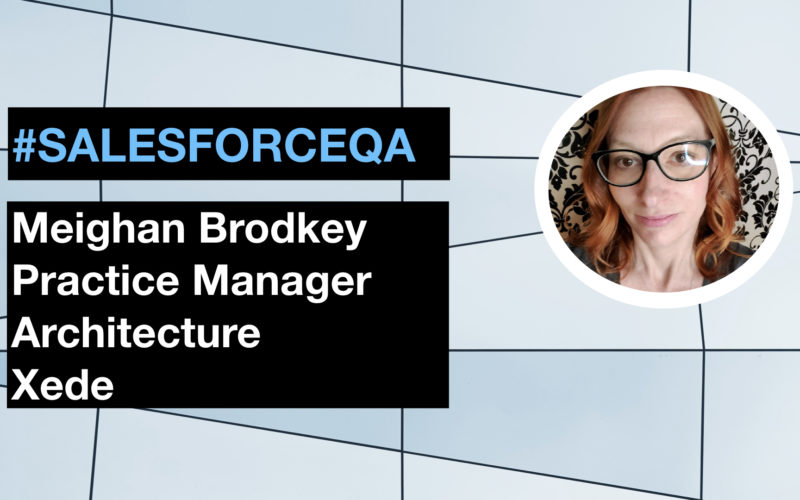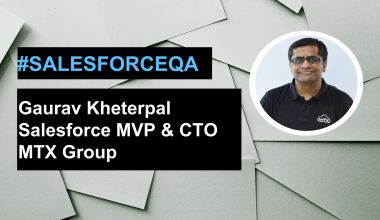In our most recent #SalesforceQA, we caught up with Salesforce MVP, Meighan Brodkey. Meighan is a Technical Architect and Practice Manager of Architecture at Xede Consulting.
Meighan talks to us about her journey from Admin to Architect. She also discusses some of the challenges she’s faced as a woman in the ecosystem and the significance of the community when it comes to improving diversity not just in Salesforce but in the world of tech in general.
Salesforce Republic (SR): You’ve had quite an interesting career in Salesforce going from an Admin to an Architect. Could you talk us through how you got into a career in the Salesforce ecosystem?
Meighan Brodkey (MB): It was a crazy situation really. I found a posting as a customer success manager, applied and then it was love at first login. My role as admin was fantastic, however, I decided it was time to get certified. So, I began working with tech companies in Seattle and this is when I started to learn about coding. This is where I really realised my passion and decided that I wanted to become a master of the platform – an Architect. I then went into consulting, which was a whole new challenge. From here, several summits reached out asking me to work with them as a TA. I’m truly grateful that I found Salesforce all those years ago, it has provided me with a career I’m so proud of, as well as a community of people like no other.
SR: As a woman in tech, what are some of the challenges when it comes to starting a career in the Salesforce ecosystem?
MB: We’re definitely a minority. However, I have noticed that there are more women working in Salesforce than other tech roles. It’s definitely more difficult as a woman working in tech and as you become more technical, you notice that there are fewer and fewer women around. You might face some animosity as you progress up the ranks but as long as you know your stuff and are able to back it up, you’ll find success. Proving yourself can be a challenge but I think that comes with any career. As long as you’re confident in yourself and your abilities, others will have confidence in you too.
SR: What advice do you have for other women looking to succeed in the Salesforce space or the world of tech in general?
MB: Try to figure out what it is that you want and keep pushing for it. It’s also really important for us women to work with each other and lift each other up. In my experience, a large amount of push back and animosity comes from other women in the industry. Because there are so few of us it can be a highly competitive environment, but it’s important that we share our experiences and help each other to succeed.
Networking is key, there are so many events now not just for Salesforce professionals but also for Women working in tech. Regardless of whether you’re interacting with the community online or in person, networking will only ever be beneficial to your career – there’s always someone that can help you.
SR: In your opinion, how important is the Salesforce community when it comes to improving diversity in the ecosystem?
MB: It’s so important! I think we can learn so much from the active ecosystem that we work in. It’s such a rare community. There are so many people willing to share their experiences and knowledge both online and in person. You can learn a lot about what you need directly from your peers. In today’s digital world we can reach each other from across the world, finding the answers to your questions has become so much easier. There are some great community groups from more general Salesforce meetups to specific events such as Women in Tech groups etc. There are always opportunities to share your experiences at community events, for example, I’m a regular speaker at the Seattle Women in Tech meetup.
SR: How do you think businesses and communities can work on improving the numbers of women working in the tech space?
MB: Again, it’s all about working together. I think it’s really important for businesses to work with the next generation of talent. High schools’ students and graduates need to be aware of the career opportunities that Salesforce (and the tech industry in general) offer. It’s a career that can be really tough to break into, especially for women. However, businesses are starting to make waves in terms of equality. I’ve definitely noticed a much more open line of communication when it comes to these issues. Saying that, there’s still some way to go. Community events can be a big help and seeing more and more businesses get involved in these is great.
SR: What are your top tips for others looking to take their career from Salesforce Admin to Technical Architect?
MB: These are my top pieces of advice when taking the journey from Admin to Architect:
- Experience – this has to be my number one tip. I think it’s important for anyone, in any role to gain experience. Be open-minded and try to get a broad range of experiences in different businesses.
- Talk to your peers. The Salesforce community is abundant with people willing to share their insights and experiences, so take the opportunity to learn from your peers.
- Join your local user group and attend community events. There are 100s of events, meetups and conferences for Salesforce professionals all over the world. These are great places to network and learn more about the ever-evolving ecosystem that we’re working in.
- Never be afraid to ask questions. This one is important. You may think that you know everything there is to know about your specialism, but I can assure you there is always something to learn. Salesforce is always changing. So, whether you’re just starting out or are a veteran of the platform, never be afraid to speak up and ask questions.
SR: In your experience, what are some of the key traits that you need in order to succeed as a Technical Architect?
MB: Be resourceful. There are always situations that will arise that might limit your abilities, whether it’s budget or technology, so being creative in your problem-solving skills is essential. Leadership and communication skills are essential. You have to make sure your team will follow you and that you have the skills to guide them to success. Teamwork is also something that will be essential to your success. You need to be able to listen to your team and work together in order to solve problems. Being knowledgeable. The CTA isn’t an easy qualification to be awarded. You need to have a desire to learn. The more knowledge you have the more successful you’ll be. Never stop learning.
SR: Do you think that Salesforce certifications are essential when it comes to success in Salesforce?
MB: Yes, due to the fact that companies do look at them. However, what I would say is don’t take certifications before you have the knowledge. In my opinion, they’re something look at getting once you’ve done some implementations and got some experience. Experience is so important when it comes to getting certified. Although I definitely do see the value in getting certified and would say it’s essential, if I had to choose between certifications or hands-on experience, I see the experience as more valuable.
SR: In your opinion, how does being involved in Salesforce community groups benefit careers?
MB: In a number of different ways. When you’re starting out (or at any stage in your career really) it helps massively with learning and increasing knowledge. Attending various events will ensure that you’re networking with and meeting new people in your area. You never know who you could meet at an event, it could be your next employer. Getting your name out there will undoubtedly benefit your career. In my opinion, it’s extremely important to participate where you can and give back to the community.
SR: Finally, what’s the best piece of advice that you have received throughout your career in Salesforce?
MB: Follow your passion. But be open-minded, trying things out is super important. Working in different industries, for different companies, on different projects, will provide you with a range of invaluable knowledge. If you’re passionate about something don’t let anyone or anything deter you. Secondly, I would say, make sure you connect with the community. Use the large ecosystem that is at your fingertips. The way I learned about Apex and Visualforce was because of the community. Without becoming involved in the community, I never would have learned a lot of what I know. Don’t just take, help out where you can too, your peers will be really grateful for any help you can give, and it helps keep the circle growing.
If you’re a certified Salesforce professional like Salesforce MVP, Meighan Brodkey, and would like to be involved in our Q&A series, please get in touch with us today!


